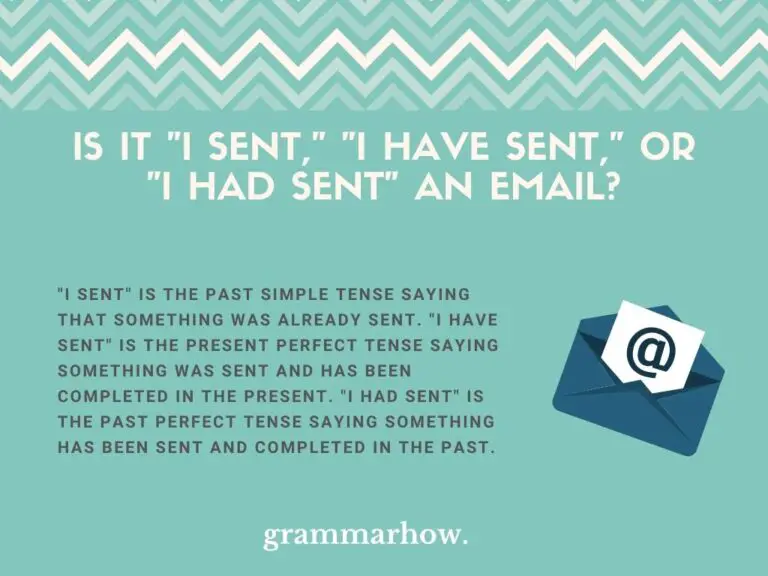
Message “What Does It Mean To Be Sent By God?” from Eddie Williams Trace Church
I sent you an email already. 2. I have sent. Find a teacher. Group Class. Community. Log in. Sign up. Open in App. lena ^^. what are their different meanings? 1. I sent you an email already. 2. I have sent you an email already. 3. I had sent you an email already. thx~ Sep 22, 2017 5:21 PM. 3. 1. Answers · 3. 4. 1. This is the past simple.

Attached Please Find a Copy of a Letter Which I Have Sent to Form Fill Out and Sign Printable
(It is used to denote an action completed in in the past.) "I have sent you" is in present perfect tense. What do you mean by sent? Sent is defined as to have conveyed or delivered. An example of to have sent something is to have put a bill in the mail yesterday. verb. Will be sent or send meaning? There is no such thing as "will be send".

10 Easy Steps How to Write an Email for Students in 2024
Explanation Of "I sent you" "I sent you" is an example of the Simple Past tense. It is used to describe an action that took place in the past and is now complete. In this sentence, the verb "sent" is in the past tense, indicating that the action happened at a specific time in the past.

Send Verb Brain
Some examples and use cases from the internet: I have sent the guards to fetch him. I have sent you the architecture books. I have sent an away team to investigate. I have sent you books about architecture. I have sent diggers to prepare a resting place for him. I have sent messages to every corner of the kingdom outlining my complicity.

“I Sent” vs “I Have Sent” vs “I Had Sent” An Email Guide)
#1 Dear all, Is that right that you say: The goods have been sent or the goods were sent yesterday/last week ? General rule: have been without time information and was without time information ? Best regards Christos DonnyB Moderator Emeritus Coventry, UK English UK Southern Standard English Apr 23, 2017 #2 More or less.
[Solved] Let M (x, y) mean " x has sent y an email message", T(x , y ) mean... Course Hero
The simple past, often signaled by 'I sent,' is your go-to when discussing actions fully completed at a definitive point in the past. This tense is straightforward and to-the-point, making it a typical preference for finalized communications.

10 Texts ALL Girls Have Sent (And What They Mean) sent แปลเนื้อหาที่เกี่ยวข้องทั้งหมดที่
3 Answers Sorted by: 3 Since the sending happened in the past (maybe just a few seconds ago, but in the past), you should use either the simple past tense (preterite): I was sent here. or the present perfect: I have been sent here. Share Improve this answer Follow answered Oct 4, 2013 at 21:24 chrylis -cautiouslyoptimistic-
I was texting my friend and then randomly… Apple Community
But "I will have it sent by tomorrow" doesn't necessarily mean the causative "I will arrange to have it sent by someone else". It's ambiguous. It can equally well mean "I will have the act of sending it completed [by me] by tomorrow", in other words the same as "I will have sent it by tomorrow". More examples where the action is clearly to be.

10 Difference Between Send and Sent with Examples 2021 Update Current School News
If a taxpayer resides in a federally declared disaster area, they also may have additional time to file. Tips to help people file in 2024. The IRS encourages taxpayers to take steps now to Get Ready to file their 2023 individual federal tax return. It's important for filers to gather all the correct information they need before filing their return.

Is It "I Sent," "I Have Sent," Or "I Had Sent" An Email? Perfect tense, Sent, Present perfect
Sent /sent/ is the past tense and past participle of send. I sent you a text - didn't you get it? He had sent some flowers to Elena. Copyright © by HarperCollins Publishers. All rights reserved. You may also like The Paul Noble Method English Quiz Confusables NEW from Collins! English Word lists Latest Word Submissions English Grammar Grammar

John 1718 Verse Of The Day for July 17, 2021
I have send Miss Hua. I could have send them as usual. I have to send riders to find Gunnar. I have to send riders to find Gunnar. Either you let me search you or I have to send for help. I have to send her an update every two hours. I have to send it to the smelter. There are drafts I have to send. I have to send my army.

God sent His Word to heal you, and His word works! He keeps His word. So (this is important
Sent is the past tense form (as in I sent you a message yesterday) and the past participle form, which is used to form the present perfect tense ( has sent ), the past perfect tense ( had sent ), and in passive voice constructions (as in The package will be sent upon receipt of payment ). When to use send or sent The verb send is an irregular verb.

bible As you sent me into the world, I have sent them into the world. John 1718 freetoedit
have sent - present perfect tense. for something that started in the past and continues in the present. for something we have done several times in the past and continue to do (i.e. actions completed in the present) had sent - past perfect tense. for something that started in the past and continued up to a given time in the past

can i start a sentence with and yet Cathern Leach
Sent vs. Send - Conclusion. 'Send' and 'sent' are different forms of the same verb. 'Sent' is the past tense and past participle form while 'send' is the base form of the verb. In this article, we shall explore the meanings of these words, their usage as well as various examples related to them.

How to know exactly when a text was sent B+C Guides
Associate. [email protected]. Silicon Valley 650.251.1142. The Corporate Transparency Act, which went into effect January 1, 2024, requires "reporting companies" in the United States to disclose information regarding its beneficial owners, i.e., the individuals who ultimately own or control a company, to the Treasury Department's Financial.

Neale Donald Walsch Quote “I have sent you nothing but angels.”
The meaning of "I have sent" is saying that we sent somebody something either in the immediate past (it just happened) or we've yet to actually send it and still need to action it in the present. This is perhaps the most common use you'll come across of the three phrases.